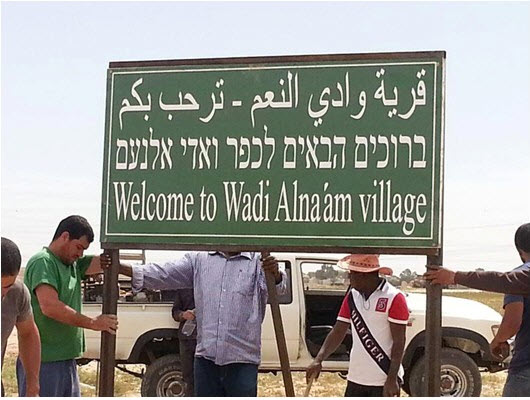At the end of July, the Housing Cabinet approved a proposal to establish a new community for the Arab-Bedouin residents of Wadi al-Na’am in the Negev, and to move all village residents to an area south of their present location, adjacent to the Bedouin township of Shaqib al-Salam (Segev Shalom). The Association for Civil Rights in Israel (ACRI) and Bimkom – Planners for Planning Rights – have appealed to the Housing Cabinet, asking it to hold yet another hearing on the proposal, as the one they approved is not acceptable to the residents of Wadi al-Na’am.
Wadi al-Na’am, today the largest unrecognized Bedouin village in Israel, was established in the 1950s when Bedouin residents of the Negev were moved to that location under martial law. Since then the community has been deemed “temporary,” and therefore, somehow, justifying its not been connected to water, electricity, sewage, telephone or roads. Residents suffer from a severe lack of services in education, healthcare and welfare.
The only solution that the authorities have offered thus far is urbanization, i.e., moving the residents to the existing Bedouin township of Shaqib al-Salam founded in 1979, following the peace agreement between Israel and Egypt. The residents of Wadi al-Na’am have continually refused this offer, as it entirely ignores their main interest – preserving their agricultural way of life.
In 2014 the residents of Wadi al-Na’am, along with ACRI and Bimkom, submitted a petition to Israel’s Supreme Court against the plan to forcibly transfer the approximately 10,000 residents of the Bedouin village to an area adjacent to Shaqib al-Salam. Following a hearing in April 2015, the Court invited the residents to submit alternatives to the location. ACRI subsequently submitted two alternative plans on behalf of the community (both consistent with the Be’er Sheva Metropolitan Area Plan). The options involved either a consortium of three rural settlements, or maintaining the current location while placing restrictions upon the expansion of the Ramat Hovav industrial area, the site of Israel’s main hazardous waste disposal facility. However, according to ACRI “the government continues to act in bad faith and has now decided to promote a decision that offers the same solution that the residents have petitioned against in the past.”
According to the July cabinet decision, the new settlement will be connected to the municipality of Shaqib al-Salam and be entirely reliant on the latter for infrastructure, with minimal space for development. All of this strongly suggests that the government’s actual plan is to make Wadi al-Na’am a neighborhood within Shaqib al-Salam. As the proposed settlement is suburban and not rural in nature, it will entirely fail to meet the needs and lifestyle of the residents of Wadi al-Na’am who, once again, lead an agricultural way of life. Not only was cabinet decision made without the agreement of the village residents, it was proposed without their knowledge or involvement. The minister and the new head of the Authority for the Advancement of Bedouin settlements in the Negev have not even met with the residents of Wadi al-Na’am, even though theirs is the largest unrecognized village in the Negev and the approved plans involve the most drastic impact to their livelihoods.
ACRI has written: “A solution that is not agreed upon is not a feasible solution. No one imagined a situation whereby ten thousand citizens, including children and the elderly, would be forcibly removed to a small area. This is not an adequate or proper response to the distress that the community has experienced for many years. The residents have already expressed their willingness to compromise to find a solution, which would require many of them to leave their homes as they are close to Ramat Hovav. Every effort must be made to reach a negotiated solution; as imposing a forced solution would infringe upon the right to recognition and the right to preserve the residents’ lifestyle.”



